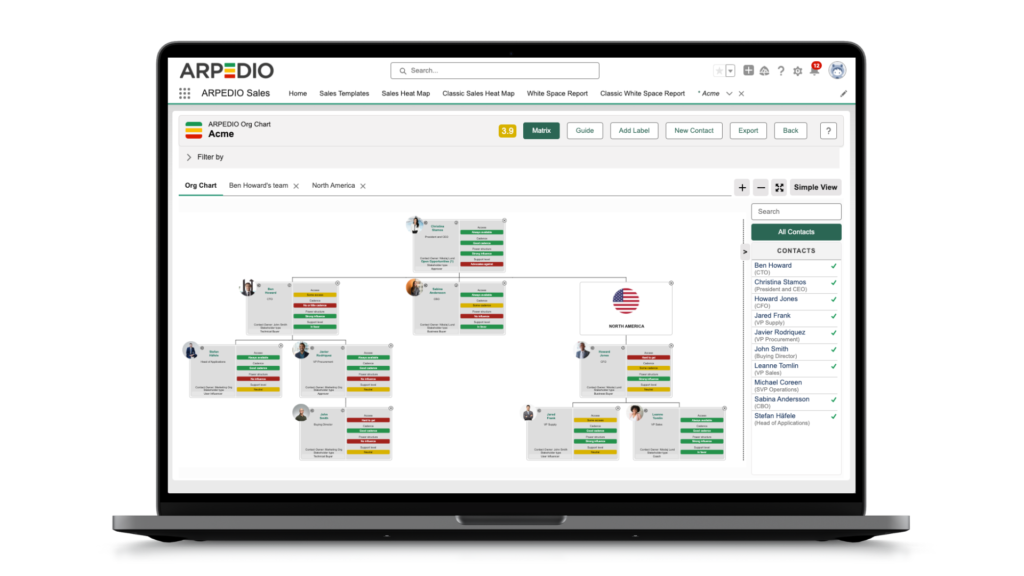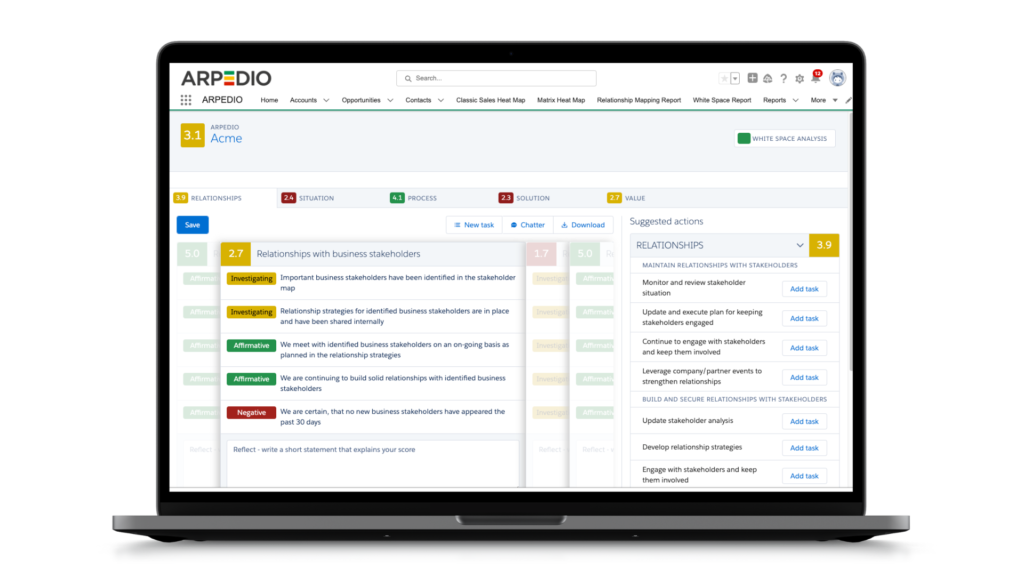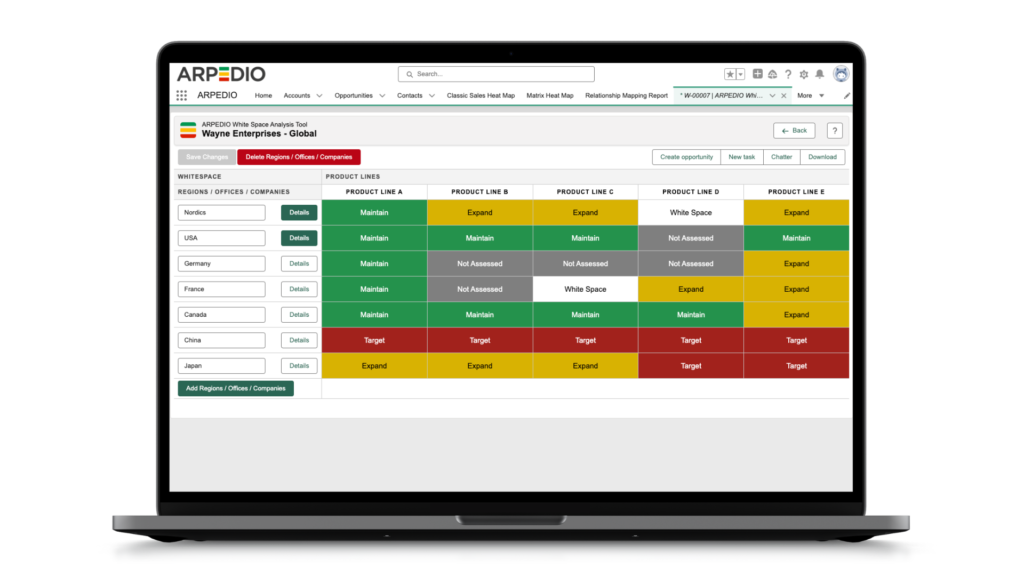There’s no doubt about it: Strategic Account Management (SAM) is the key to success in today's competitive market. With the right strategic approach, you can maximize your customer relationships, build long-term loyalty, and drive growth. But you need the right tools and processes to unlock the power of SAM in sales before you can watch your business soar. We recommend you keep reading.
Table of Contents
What is Strategic Account Management?
Everyone wants to build and maintain strong relationships with their customers that lead to mutually beneficial and long-term success. But not everyone has the right strategies and tactics in place that are needed to develop successful relationships – you know, the ones that drive revenue growth and customer loyalty.
Strategic account management (or SAM) is a business process and set of best practices designed to help organizations better manage their relationships with their most important and/or highest-value customers.
The process involves the management of customer relationships with the aim to increase customer loyalty and ultimately maximize revenue. It involves developing customized strategies to engage customers and meet their needs. Once you build strong customer relationships and create value through strategic partnerships, you can identify and capitalize on opportunities for growth.
Using Account Management Software can greatly improve the efficiency and effectiveness of strategic account management processes, allowing businesses to easily track customer interactions and identify areas for improvement in their relationship management strategies.
What is a Strategic Account?
A strategic account is a customer that is particularly important to a business. These customers are usually large and may be long-term or high-value customers, and the focus is typically on relationship building, customer loyalty, and customer retention.
Strategic accounts are often managed by a dedicated team that focuses on understanding the customer’s needs, developing a deep relationship and providing a high level of service to the customer. The team works to identify ways the company can provide value to the customer, such as new products, services, or solutions that the customer may not have considered. The team also works to identify opportunities for the company to benefit from the strategic relationship, as they typically have a significant impact on the company’s bottom line and thus, are important to the company’s overall strategy. Let’s dive more into that in the following.
Difference between Strategic Account Management and Account Management
Before we dive deeper into the subject of Strategic Account Management, let’s just establish: Strategic Account Management is the process used to manage and build relationships with key customers. It’s an important component of Customer Relationship Management (CRM) and helps to ensure that the most important customers are given the highest priority. This definition may sound a lot like the Account Management practice we know. And sure, Strategic Account Management and Account Management are similar in that they both involve managing relationships with customers. But, they do have some distinct differences. Strategic Account Management focuses on high value customers, working with them to develop long-term plans and strategies for growth. Account Management focuses on managing day-to-day customer relationships, handling customer service and account inquiries, and providing customer support.
Thus, Strategic Account Managers typically have a broader understanding of the customer’s business goals, as they should be able to offer advice and insight to help the customer reach their goals by developing solutions that maximize their satisfaction and long-term value.
What should Strategic Account Management Include?
The primary objectives of Strategic Account Management are to drive customer loyalty, increase customer retention, and maximize customer lifetime value. With this in mind, the key components of Strategic Account Management are as follows:
1. Identifying which customers are most important to your organization
The first step in Strategic Account Management is to identify which customers are most important to your organization. This involves analyzing customer data to determine which customers have the most potential for growth, provide the most value, or are most likely to remain customers for the long-term.
2. Developing a plan for each account
Once you have identified which customers are most important to your organization, the next step is to develop a plan for managing each account. This includes setting goals and objectives for the account, defining strategies for engaging and retaining customers, and creating a timeline for reaching the objectives.
3. Developing a relationship strategy
The relationship strategy is the cornerstone of Strategic Account Management. It involves understanding the customer’s needs, building.
Strategic Account Management Process
Now we’ve established the cornerstones of Strategic Account Management. But in order to practice it (and do it well), the organization needs to have a clear process or set of best practices in place on how to manage their relationships with their most important customers. It could very well look like this:
This should include setting goals, understanding customer needs, and establishing ways to measure success.
Get to know your customer, their industry, and their particular business needs. It’s extremely important to establish trust and build rapport.
Identify the resources available to support your customer and use them to create value.
Make sure to stay in contact with your customer and keep them informed of any changes or updates.
Collect and analyze data to get a better understanding of your customer’s needs and how to best serve them.
Offer solutions and services that will create value for your customer and grow the relationship over time.
Track progress and measure performance against goals to ensure that your customer is satisfied.
Strategic Account Managers: The Key Players in Strategic Account Management
Strategic Account Managers play a pivotal role in the success of strategic account management initiatives. As the primary point of contact between the company and its most valuable customers, Strategic Account Managers are responsible for driving growth, fostering strong relationships, and ensuring customer satisfaction.
What Does A Strategic Account Manager Do?
A Strategic Account Manager is a professional responsible for maintaining and developing relationships with key customers. Strategic Account Managers work with clients to understand their needs and develop long-term strategies to help them meet their goals. They are responsible for identifying new sales opportunities, developing service and product offerings, and negotiating contracts. They also handle customer complaints and disputes, and work to ensure customer satisfaction.
The main difference between a Strategic Account Manager and an Account Manager is the scope of their roles. As briefly touched upon in the above, a Strategic Account Manager typically works with larger clients and is responsible for managing and maintaining the relationship between the company and its key customers. This includes understanding the customer’s needs, developing strategies to address those needs, and working with other internal departments to ensure that the customer’s goals are met. An Account Manager, on the other hand, is typically responsible for managing the relationship between the company and a smaller number of clients. Their focus is usually also on meeting the customer’s needs, but more in terms of ensuring that their service or product is of high quality.
Thus, a Strategic Account Manager works to identify customer needs, develop strategies to meet those needs, and build long-term relationships with customers. They also work to identify potential new business opportunities and work to close sales.
Responsibilities of Strategic Account Managers
Understanding Customer Needs: Strategic Account Managers work closely with customers to understand their business objectives, challenges, and priorities. By gaining deep insights into customer needs, Strategic Account Managers can identify opportunities for value creation and develop tailored solutions to address them.
Developing Account Strategies: Strategic Account Managers develop comprehensive account strategies aimed at maximizing customer value and driving growth. This involves analyzing account performance, identifying growth opportunities, and aligning company resources and initiatives with customer objectives.
Driving Customer Engagement: Strategic Account Managers are responsible for maintaining regular communication and engagement with customers to ensure their needs are met and expectations are exceeded. This includes conducting regular business reviews, providing proactive support and guidance, and addressing any issues or concerns that may arise.
Facilitating Cross-Functional Collaboration: Strategic Account Managers collaborate closely with internal teams, including sales, marketing, product development, and customer support, to ensure a seamless and coordinated approach to serving the customer. By facilitating cross-functional collaboration, Strategic Account Managers can deliver integrated solutions that meet customer needs and drive value.
Driving Revenue Growth: Ultimately, the goal of Strategic Account Managers is to drive revenue growth and profitability within strategic accounts. This involves identifying opportunities for upselling and cross-selling, negotiating contract renewals, and maximizing customer lifetime value through strategic account management initiatives.
Qualities of Successful Strategic Account Managers
Successful Strategic Account Managers possess a unique blend of skills, traits, and qualities that enable them to excel in their role:
- Strong Relationship-Building Skills: Strategic Account Managers must be able to build trust, rapport, and credibility with customers at all levels of the organization.
- Strategic Thinking and Business Acumen: Strategic Account Managers must have a deep understanding of both their own company’s offerings and the customer’s industry, business model, and competitive landscape.
- Effective Communication Skills: Strategic Account Managers must be able to communicate effectively with internal teams and external customers, conveying complex ideas and information in a clear and concise manner.
- Problem-Solving and Negotiation Skills: Strategic Account Managers must be adept at identifying and addressing customer challenges and objections, as well as negotiating mutually beneficial outcomes.
- Results-Oriented Mindset: Strategic Account Managers must be driven by results and outcomes, constantly seeking opportunities to add value and drive growth within their accounts.
In summary, Strategic Account Managers play a critical role in driving success within strategic accounts. By understanding customer needs, developing account strategies, driving engagement, facilitating collaboration, and driving revenue growth, Strategic Account Managers can deliver exceptional value and ensure long-term success for both their company and their customers.
Account Management Strategy
An account management strategy is a type of marketing strategy used by companies to identify, prioritize, and analyze target accounts in order to maximize sales opportunities. This involves researching and analyzing customer needs, competitive landscapes, and the company’s competitive advantages in order to develop tailored strategies for each target account. Account planning strategies are used to increase customer loyalty, drive increased sales, and develop successful customer relationships, as you may be familiar with by now.
More specifically, account management strategy is used to develop a comprehensive plan for how to attract, retain, and grow the customer base of a business. It typically involves market segmentation, customer research, and the development of an effective marketing strategy. And of course, the goal of account planning is to ensure that a business is targeting the right customers with the right message, and that it is delivering the best customer experience possible.
SAM Accounts
Strategic Account Manager Accounts are individual accounts that are managed by a Strategic Account Manager (SAM). These accounts are typically large, enterprise-level accounts that require a high level of personalized attention and customer service. SAMs work closely with their customers to ensure that their needs are met and that their products and services are optimized for their business needs. They also work to build relationships and loyalty with their customers so that they remain a long-term partner.
The Strategic Account Management Association
ARPEDIO is proud to be a Global Technology Partner of The Strategic Account Management Association (SAMA). It is the largest and most diverse community of strategic accounts practitioners in the world, dedicated to the advancement of the SAM profession.
In close collaboration, ARPEDIO and SAMA have brought a cutting-edge solution for SAM’s to assess and progress through the world-renowned 7-step value co-creation framework. Learn more about the unique collaboration and explore the 7-step process in ARPEDIO’s powerful account management and relationship assessment platform here.
Summary
The primary objectives of Strategic Account Management are to identify and cultivate opportunities, build long-term customer relationships, and proactively manage customer accounts. But due to the complexity of Account Management, it’s easy to lose track of data, insights, or people. This can be both time consuming and costly. A Strategic Account Manager is responsible for developing and maintaining a strong customer base, developing strategies to increase customer loyalty, and ensuring customer satisfaction – so your organization continually can win from long-term partnerships.


















